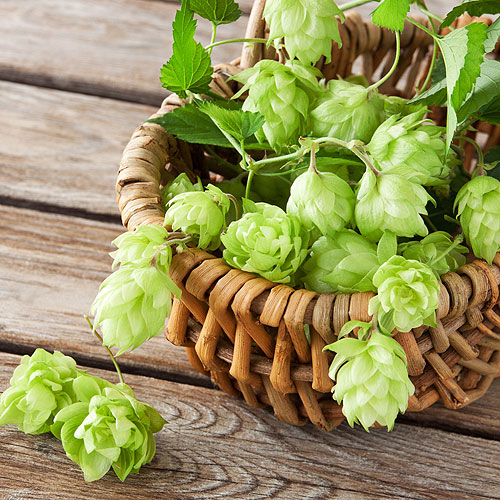(Humulus lupulus L.)
Hop is a perennial vine of the same family as hemp. It is characterized by Dioecy or the occurrence of male and female flowers on different individuals. The natural habitat of hop is the zone of temperate climate of Europe, Asia and North America 1. It is a plant widely used in the brewing industry as an intermediate in the production of beer, which gives it the characteristic bitterness and aroma.
The raw material used in phytotherapy are the cones (fructifications) and the lupulin. Lupulin are glandular hairs, which have been stripped from the dried cones. It is a viscous, orange or green-yellowish powder 2.
Both of the raw materials contain essential oil, and lupulin is particularly rich in bitter acids. Cones and lupulin demonstrate mild sleeping and tranquilizing effects. These properties are the reason that the hop has found application in the treatment of mild states of nervous tension, anxiety and periodic difficulties with falling asleep 2,3. It is often found in complex products in combination with other herbal components of sedative effects, for example Valerian or Passiflora 4.
Extract of hop cones is one of the components of the fluid Nervosol and tablets Nervosol Sen. Both formulations support healthy sleep and help calm emotions.
1 Herbal Medicine expanded commission E Mongraphs, s. 193-195
2 E. Lamer-Zarawska, B. Kowal-Gierczak, J. Niedworok, Fitoterapia i Leki Roślinne, wyd. PZWL, Warszawa 2007, s. 117-118
3 H. Strzelecka, J. Kowalski, Encyklopedia Zielarstwa i Ziołolecznictwa, Wyd. Naukowe PWN, Warszawa 2000, s. 87
4 C. E. Ulbricht, Natural Standard, Herb&Supplement Guide, Mosby Elsevier 2010, s. 411-412


